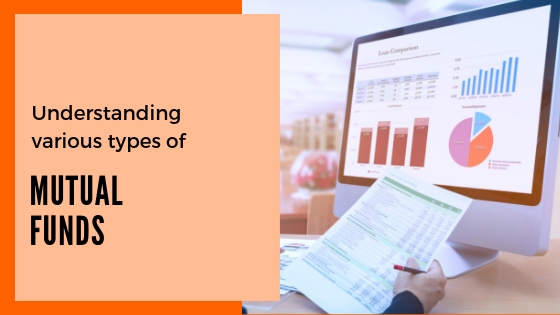- +91 9688624444
+91 9994724442 -
"AMFI-Registered Mutual Fund Distributor"


"AMFI-Registered Mutual Fund Distributor"



Here’s How To Select The Right Type Of Mutual Fund
We all love to have choices in different aspects of our life. Whether it is books, clothes or career, options are essential. Everyone has different inclinations and tastes, and hence, selecting the right choice is utmost vital.
Similar is the case with mutual funds. Mutual funds also come in various shapes and sizes to suit every investor and make their dreams come true. No matter what kind of investor you are or your goals are, there will be a mutual fund for you. But finding the right type of mutual fund may not be easy for a lot of new investors.
Mutual funds can be classified into various categories based on its assets, options etc. In this article, let us try to understand these types of mutual funds that will help you to find out what will suit you the best.
Based on asset class:
Equity and debt are two major types of assets where mutual funds invest. They have different objectives. While equities are mostly for capital appreciation in the long term, the aim of the debt is capital protection along with moderate returns.
There are three different types of mutual funds based on the asset classes: equity funds, debt funds and hybrid funds.
The type of fund that will suit you the best will depend on your investment horizon. For example, if you want to buy a house in 15 years, then 15 years is your investment horizon. In another instance, if you are planning for an exotic vacation in less than a year, then one year is your
limit.
For long term goals of five years and more, equity fund is the best option. Equity funds tend to be volatile in the short run, and the risks are evened out in the long run. Debt funds are good investment options for short term goals of around three years or less. For your financial goals of 3 to 5 years horizon, hybrid funds can be the ideal category.
Open-ended and close-ended funds
A fund remains open for initial subscription for a limited number of days during its launch. It is the new fund offer (NFO) period. In close-ended funds, investors can only invest during the NFO period. Close-ended funds come with a specific period of say three years. Also, investors do not have the option to invest more or exit during the period. After the period is over, investors have to redeem the mutual fund units. Also, systematic investment plan(SIP) is not available for close-ended funds.
Open-ended funds do not have these limitations. These funds remain open for entry and exit, making it an ideal choice for goal planning. It helps you to adjust your goals according to your life stage. It allows prioritising your goals. For example, buying a home is your priority; you can invest more and increase your SIP regularly. Once, you reach your target amount, you can easily redeem your units. You do not have to wait for the maturity date. Hence, an open-ended fund is a better option than a close-ended fund.
Growth and dividend options
Fund houses also offer two options: growth and dividend option. In the growth option, the fund reinvests the profits back in the fund. As a result, the net asset value (NAV) of the fund keeps on rising as the scheme gains. This helps you to take advantage of the power of compounding. In the case of dividend option, investors get the profits declared by the fund. Hence, the NAV comes down as and when the dividends are declared.
The growth option is better to build wealth over time and fulfil your financial goals. And if you're looking for a regular income source, then you can choose a systematic withdrawal plan (SWP) instead of dividend option. In the case of SWP, you receive a fixed sum of money regularly, and the remaining corpus in the fund will continue to grow.
Hence, go for growth option to fulfil your financial goals.
Conclusion:We have seen that the category and type of fund that you need to select depending on your financial goals. Moreover, the growth option in open-ended funds is a better option for investors. It gives the benefits of compounding, along with liquidity.
To know more, consult your financial advisor.
+91 9944110800
+91 9688624444
Gain Orbit is an AMFI Registered Mutual Fund Distributor. We suggest investment products keeping in mind suitability profile of our clients.
Risk Factors – Investments in Mutual Funds are subject to Market Risks. Read all scheme related documents carefully before investing. Mutual Fund Schemes do not assure or guarantee any returns. Past performances of any Mutual Fund Scheme may or may not be sustained in future. There is no guarantee that the investment objective of any suggested scheme shall be achieved. All existing and prospective investors are advised to check and evaluate the Exit loads and other cost structure (TER) applicable at the time of making the investment before finalizing on any investment decision for Mutual Funds schemes. We deal in Regular Plans only for Mutual Fund Schemes and earn a Trailing Commission on client investments. Disclosure For Commission earnings is made to clients at the time of investments. Option of Direct Plan for every Mutual Fund Scheme is available to investors offering advantage of lower expense ratio. We are not entitled to earn any commission on Direct plans. Hence we do not deal in Direct Plans.
Disclaimer | Commission Disclosure | Privacy Policy | Terms & Conditions | SID/SAI/KIM | Code Of Conduct
ARN: 276356 | EUIN: E520629 | Validity: 13-Sep-2026 | Initial Registration: 14-Sep-2023